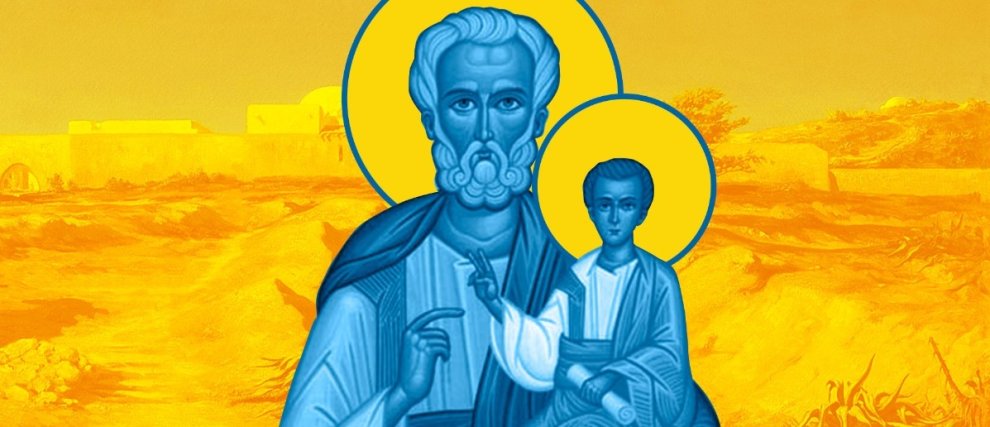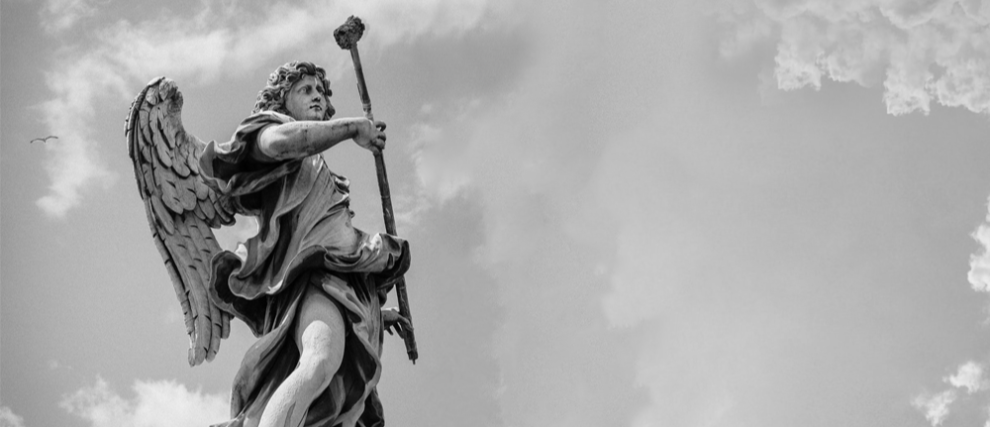Saint John Chrystostom
Biography of John Chrysostome
John of Antioche was born around 349 in Antioch (Antakya in present-day Turkey). His father died when he was very young and John grew up with his mother who transmitted a deep faith to him. He studied philosophy and rhetoric, becoming the greatest orator of Greek antiquity, and was called Chrysostom, which means "Golden Mouth," because of his eloquence.
John was baptized in 368 and entered ecclesiastical life as a "reader." He then attended a seminary in Antioch with other young people, under the direction of Diodorus of Tarsus, a famous exegete. The young man was ordained a priest and ran his pastoral ministry in his hometown. Soon after, he decided to live as a hermit in the caves of Mount Silpio and would lead this life of asceticism for four years, spending his time meditating on the Gospels and the Letters of Saint Paul. In his hermitage, John acquired a deep knowledge of the Bible that he would transmit throughout his life in his pastoral mission. Having fallen ill, the hermit John was forced to join the Christian community of Antioch in order to be cared for. This marks a turning point in his journey and allowed him to fully enter into his true vocation as a pastor of souls.
Returning to the city in 378, John began to preach the word of God to all. In 381, he became a deacon and was ordained a priest in 386. Gifted with exceptional speaking skills, he gave remarkable sermons. In 387, the "revolt of the statues" took place, when John pronounced 22 famous homilies calling for penance and conversion. Saint John Chrysostom also gave beautiful catechisms for the preparation for baptism. He explained in particular that the value of man lies in the "exact knowledge of the true doctrine and in the rectitude of life". For him, these two elements always go hand in hand: knowledge of the truth and life in accordance with the Gospel. John of Antioch sought above all to touch souls with his words, to help them to walk in the footsteps of Christ. The Eucharist and the Word of God were at the heart of his preaching.
John was appointed bishop of Constantinople in 397. From the beginning of his ministry, he worked to reform his Church into a sense of austerity. He was also called the "Chaplain" because of his great attention to the poor. Exercising episcopal ministry in the capital of the Empire was not without trials, and John defended the Christian faith despite the pressure of imperial power and the political intrigues he faced. For this reason, he was sentenced to exile on two occasions, between 403 and 407, first on the shores of the Black Sea (in present-day Georgia) and then in Armenia. Letters from the period of exile show John's constant concern for his own and his compassion for the persecuted. Bishop John did not recover from the imposed fatigue and died in exile in Comana on September 14, 407, on the feast of the Exaltation of the Holy Cross. It was in the chapel of the martyr Saint Basilicus that John gave up his spirit and was buried. Today the relics of the saint rest in Rome.
Saint John Chrysostom is one of the Fathers of the Eastern Church and Doctor of the Catholic Church, he is celebrated on September 13. He is the patron saint of speakers, television presenters, lecturers, etc.
Discover other lives of holy Fathers of the Church, such as St Gregory of Nazianzus, St Basil of Caesarea, St Augustine of Hippo, St Jerome, and St Cyril of Alexandria.
Works and heritage of Saint John Chrysostom
Written by Saint John Chrysostom
An anonymous copyist wrote that the works of Saint John Chrysostom "cross the whole world like lightning flashes." His writings consist above all of his homilies. More than 700 homilies of Saint John Chrysostom have reached us. These famous preaching teach the faith in Christ, they are based on the Old and New Testaments: homilies against Arians, homilies commemorating the martyrs of Antioch, and homilies of the liturgical feasts (Easter homily). Among the most famous are his Homilies on Genesis. In addition to the sermons, there are 17 treatises of Saint John of Antioch and 241 letters. Finally, an important part of the work of Saint John Chrysostom consists of the commentaries on the Gospel of Saint Matthew and the Epistles of Saint Paul.
The Liturgy of Saint John Chrysostom
One of the most remarkable legacies of Saint John of Antioch is his liturgy. It is the one that is still most often celebrated today in the Byzantine Orthodox tradition. It was set up by the Cappadocian Fathers and established by St John Chrysostom, then Bishop of Constantinople, in the main basilica of the Byzantine Empire, St Sophia. Then, this liturgy was gradually adopted by the whole Empire.
Quotes from Saint John Chrysostom
The one who was called "Golden Mouth" because of his eloquence leaves to posterity words that testify to his luminous spirituality. Here are some beautiful quotations from Saint John Chrysostom:
- On spiritual battles
"If it did not cost us to be virtuous, what would be the merit of being so?”
"The present is a time of combat, so we must fight.”
- Seek to live holy
“Virtue makes us enjoy, even before obtaining eternal rewards, the incomparable pleasure of good conscience and the hope of future happiness.”
"No matter how accurate your words are, you ruin everything when you speak angrily.”
- On the regret of our faults
"We are right in counting the tribulations that afflict us; are we also right in counting the sins that attract us?”
- On the mercy of God
“More jealous than yourselves of your salvation, the Lord is anxious to forgive you. All he asks of you is that you confess that you have offended him, and that you ask of his goodness a forgiveness which he desires more than you give yourself. But you fear; the feeling of your iniquities glazes your tongue. It is this very thing that should excite your confidence; the less you think you deserve grace, the more sure you are of obtaining it. ”
- Protecting oneself from sin
"All the precepts of the divine law are linked to one another. Neglect at one point can ruin everyone.”
"Let us not be content to flee sin, let us still flee those things which seem indifferent at first glance, but which, little by little, lead to sin.”
- On mourning
"It is not by our tears, but only by our prayers, our almsgiving, and our good works, that we will bring some relief to our dead.”
Prayers of Saint John Chrysostom
The Prayer of Abandonment of Saint John Chrysostom
Lord, may your will be done in me, a poor sinner
Lord, receive me in my repentance.
Lord, do not forsake me.
Lord, save me from all peril.
Lord, give me good thoughts.
Lord, give me tears, and the memory of death, and wrath.
Lord, give birth to a desire in me to confess my sins.
Lord, give me humility, chastity and obedience.
Lord, grant me patience, courage and meekness.
Lord, put into my heart the root of all things, Your salvation. Lord, make me capable of loving You with all my soul and with all my strength, and of fulfilling in all things Your will.
Lord, protect me against certain men, against demons, against passions and all other pernicious things.
You know, Lord, that it is for You to do all that pleases You: also let Your will be done in me poor sinner; for you are blessed in all ages. Amen

